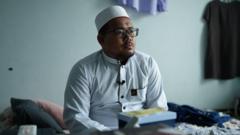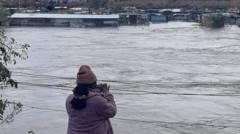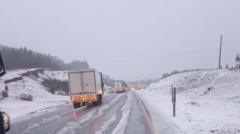A powerful earthquake has devastated central Myanmar, claiming over 2,700 lives, including around 170 from the local Muslim community. Survivors, like imam Soe Nay Oo, mourn their loved ones and face challenges in burial practices due to ongoing conflict. As they cope, these individuals strive to help in rescue efforts despite their grief.
Heartbreak in Myanmar: A Community Shattered by Earthquake Tragedy

Heartbreak in Myanmar: A Community Shattered by Earthquake Tragedy
An imam reflects on losing 170 friends and family members to a devastating earthquake that struck Myanmar during Ramadan.
The call to prayer rang out in Sagaing last Friday when tragedy struck central Myanmar, as a magnitude earthquake devastated the area just before Eid, marking the end of Ramadan. The quake, occurring at 12:51 local time (06:21 GMT), led to the collapse of three mosques, including the Myoma mosque—the largest in the region—trapping many worshippers inside.
Among those who felt the quake was Soe Nay Oo, a former imam of the Myoma mosque who currently lives in Mae Sot, Thailand, where he had sought refuge after fleeing Myanmar's military coup in 2021. Over the following days, he learned that nearly 170 of his relatives, friends, and former congregants perished in the disaster, which has now claimed over 2,700 lives.
Soe Nay Oo shared his heartbreak with the BBC, expressing anguish over the fate of children and victims' families. "I can't hold back my tears when I talk about this," he said, reflecting on the profound loss felt within his tightly-knit community. Eyewitness accounts confirmed that the Myoma Street area bore the brunt of the quake’s destruction, with a significant number of fatalities reported—including approximately 500 Muslims who were praying when the disaster unfolded.
As families sought refuge on streets where their homes had collapsed, they faced looming shortages of food and basic necessities. Rescuers have been working tirelessly to extract bodies from the rubble, revealing heartbreaking scenes of worshippers who had desperately tried to escape but were caught by the collapsing structures.
Among Soe Nay Oo's tragic losses was a beloved cousin of his wife and a well-respected businessman in the community. He expressed deep sorrow for those who would have quickly become family. “The loss is unbearable for us,” he lamented. Other notable victims included his former assistant imam and a key female community leader, highlighting the immense impact on the community’s fabric.
Even in their grief, survivors are facing barriers in traditional Islamic burial practices due to nearby military conflicts. The local Muslim cemetery has been closed due to the ongoing strife, forcing families to transport their deceased across treacherous routes to ensure a proper burial. This has left many families without closure, as Islamic traditions call for witnessing their loved ones' burial.
Soe Nay Oo has now shifted his focus from human rights efforts to emergency aid coordination in Sagaing, as he hears from those still requiring assistance. "I feel relief only whenever somebody on the ground asks for help, and I can help them," he mentioned. However, survivor's guilt weighs heavy on him, as he mourns not only his community's loss but also his inability to be present during the earthquake.
The devastation wrought by this earthquake serves not only as a tragedy for the families affected but also highlights the ongoing struggles facing Myanmar, as communities continue to navigate the intertwined paths of natural disaster and civil unrest.






















